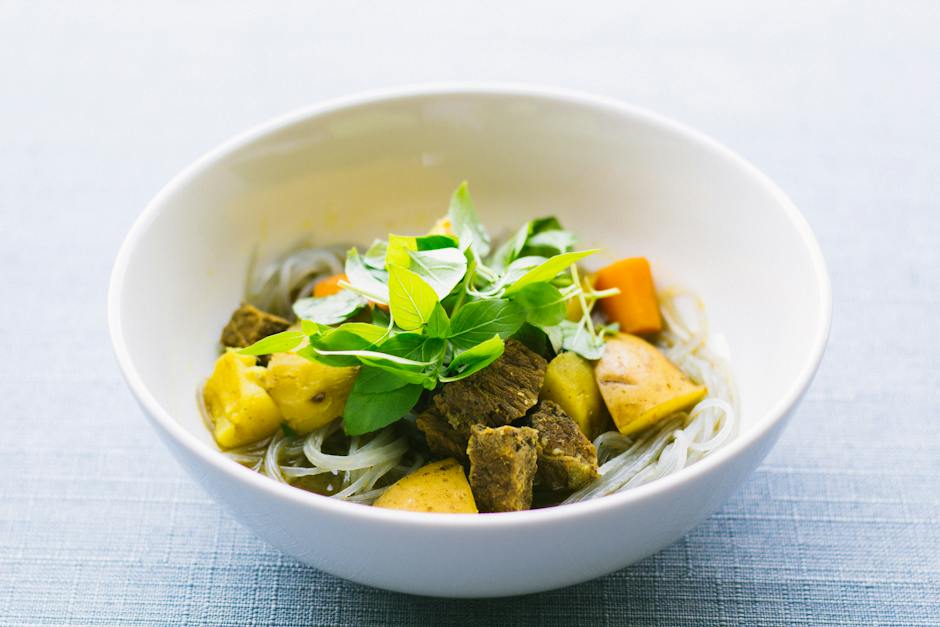Is Pho Healthy? Unveiling the Nutritional Facts of This Vietnamese Delight
Pho, the traditional Vietnamese soup, has taken the world by storm. With its aromatic broth, tender meats, and fresh herbs, it’s no wonder that this dish has become a global sensation. But beyond its delicious taste, many health-conscious individuals are asking: Is pho healthy? In this comprehensive guide, we’ll dive deep into the nutritional aspects of pho, answer commonly searched questions, and help you understand how this beloved dish fits into a balanced diet.
Introduction to Pho: A Culinary Staple from Vietnam
Before we delve into the health implications of pho, let’s take a moment to appreciate its origins. Pho is a classic Vietnamese soup that combines rice noodles with a flavorful broth, typically made from beef or chicken. It’s garnished with a variety of fresh ingredients such as herbs, bean sprouts, lime, and chilies. The result is a comforting bowl that’s both satisfying and aromatic.
But what about its nutritional content? In this article, we’ll explore the ingredients of pho, its calorie count, potential health benefits, and tips for making healthier choices when enjoying this dish. Whether you’re a pho aficionado or a curious foodie, this post will provide you with all the information you need to enjoy pho as part of a healthy lifestyle.
What Goes into a Bowl of Pho?
The Core Components of Pho
- Broth: The soul of any pho dish, the broth is typically simmered for hours with spices like star anise, cinnamon, and cloves.
- Rice Noodles: These are the carbohydrate base of pho, providing energy and substance.
- Protein: Options include thinly sliced beef, chicken, or tofu for vegetarian versions.
- Garnishes: Fresh herbs like basil and cilantro, bean sprouts, lime wedges, and sliced chilies add flavor and nutritional value.
The Caloric Breakdown of Pho
Understanding the calorie content is crucial when assessing if pho is healthy. A standard bowl of beef pho can contain anywhere from 350 to 500 calories, depending on the portion size and ingredients used. It’s important to consider the balance of macronutrients: carbohydrates from noodles, protein from meat, and minimal fats.
Is Pho Good for You? The Health Benefits Explained
Nutritional Advantages of Pho
Pho can be a nutritious option, especially when focusing on its components:
- Rich in Vitamins and Minerals: The fresh herbs and vegetables in pho provide essential vitamins and minerals.
- Protein-Packed: With lean cuts of meat or tofu, pho can be an excellent source of protein.
- Hydration: The broth-based nature of pho helps with staying hydrated.
Potential Concerns with Pho
While pho has many health benefits, there are also aspects to be mindful of:
- Sodium Content: Pho broth can be high in sodium, which is something to watch for those monitoring their salt intake.
- Portion Sizes: Large servings can lead to overconsumption of calories and carbohydrates.
How to Make Your Pho Healthier
Tips for a Nutritious Bowl of Pho
- Opt for Lean Proteins: Choose cuts like chicken breast or lean beef to reduce fat intake.
- Load Up on Vegetables: Increase the number of veggies for added fiber and nutrients.
- Be Mindful of Portions: Consider eating half the noodles or asking for a smaller serving.
Customizing Your Pho Order
When dining out, don’t hesitate to customize your order:
- Ask for Less Noodles: Reduce the carb content by requesting fewer noodles.
- Request More Broth: Enjoy the flavors without overindulging in calories.
- Control the Add-ins: Limit high-calorie sauces and add more herbs and sprouts instead.
Commonly Asked Questions About Pho and Health
Is Pho Gluten-Free?
Most traditional pho recipes use rice noodles, which are naturally gluten-free. However, always confirm with the restaurant to ensure there’s no cross-contamination or use of additives containing gluten.
Can Pho Help with Weight Loss?
Pho can be part of a weight loss diet if consumed mindfully. The key is to focus on lean proteins, lots of vegetables, and controlled portion sizes to create a balanced meal.
Is Pho Considered a Clean Eating Option?
Pho can align with clean eating principles if it’s made with whole, unprocessed ingredients. Homemade pho or carefully selected restaurant dishes can meet this criterion.
Conclusion: Embracing Pho in a Healthy Diet
In conclusion, pho can indeed be a healthy option when enjoyed with a mindful approach. By understanding the ingredients and making smart choices, you can incorporate this Vietnamese staple into your diet without compromising on nutrition. Remember to balance your portions, opt for lean proteins, and load up on fresh veggies to make the most out of your pho experience.
Whether you’re seeking comfort food or a nutritious meal, pho offers both taste and health benefits. So next time you’re pondering over a bowl of this aromatic soup, rest assured that with the right choices, pho can be a delightful addition to your healthy eating repertoire.


